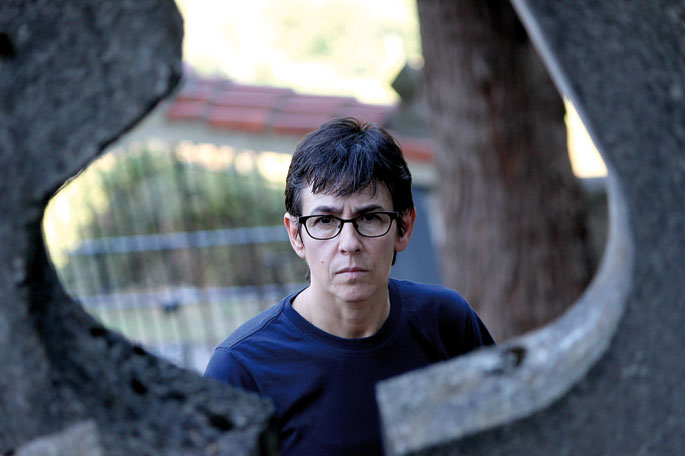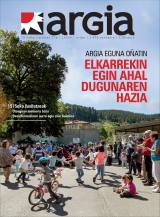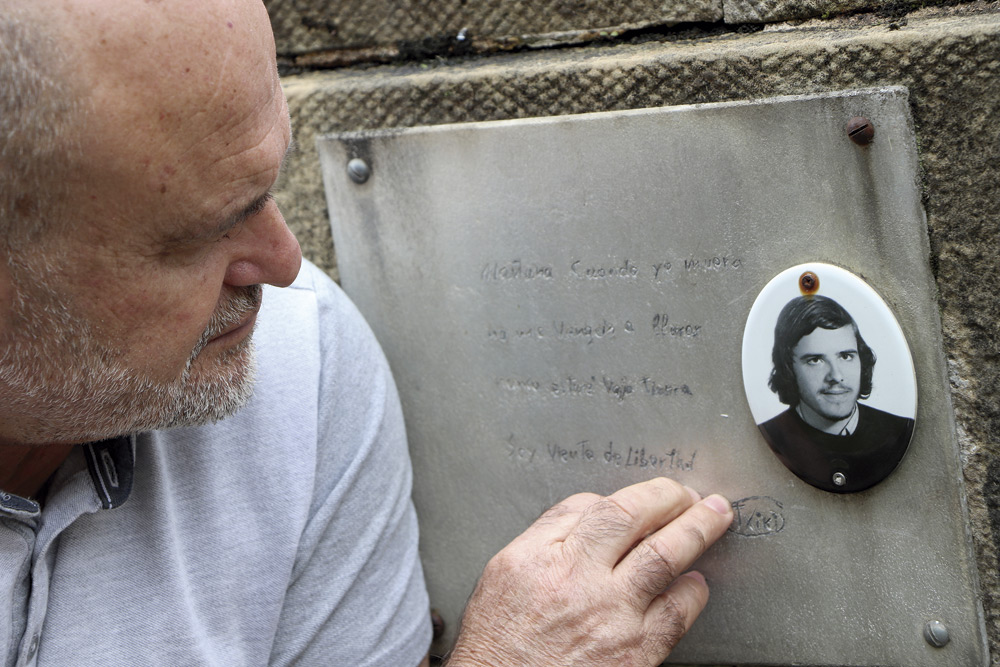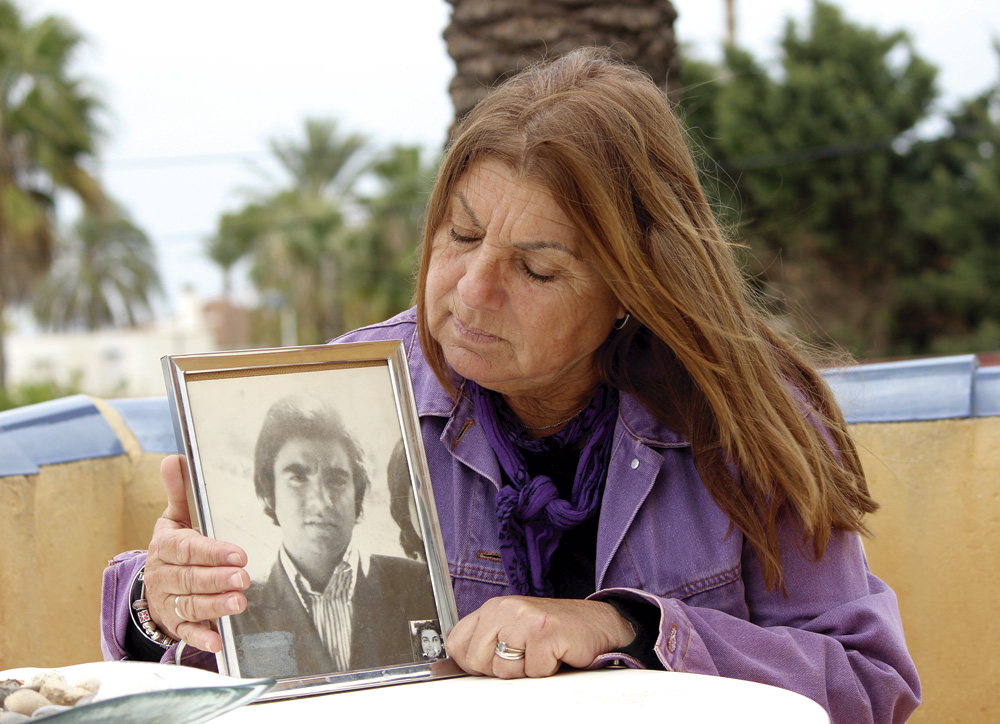"Came what we didn't think: the victim was recognized."
- Going up the hill of the Nuarbe of the cemetery / Then they were children / The seven pines wait. / In the cemetery the doors are always open. We took Mertxe as a poem guide, and we climbed up the Nuarbe slope of the cemetery. The poet does not lie: Nuarbe always has the doors open in the cemetery.

We went up the road to Nuarbe, in the cemetery, as I would have liked to do this year with her mother Mertxe.
It is too late. Our mother is on her way to turning 88, and she's not capable. It first fell. Then he was prescribed his medicines. He ended up completely confused. It's incapable. I told her how you were going to come, but I don't even know how many I understand.
In 40 years he has been the guardian of Anjel Otaegi's memory.
Yes, that has been the case. Anjel's mother died in 1980 and since then our mother has been telling each other how those days looked. My mother had always been by her side. My mother was Anjel's aunt, but not only was she an aunt, but also a second mother, who my mother took care of for a long time. And I remember when they knew they were going to kill Anjel, he came to our house and he cried and cried.
Do you remember? He was 12 years old in 1975.
I was 11 years old, I was 12 in October, but I remember. Angel died and we stayed in the cemetery from three o'clock in the afternoon until the body arrived. Nobody but the family allowed him to enter the cemetery: we came with my aunt, Angel's mother. A girl next door, sister of the whistle, Urretxu's cousin, my five-year-old sister, Idoia and I. Always with my aunt. Also came the sister of Garmendia [Artola, condemned to death by Otaegi]. The civil guard allowed us to enter only those in the house, and so, we weren't more than half a dozen people inside the cemetery.
Angel's mother was with you, your parents in Burgos.
Yes, yes! My aunt and my father and my mother left the day before, in the evening, with Patxi Uranga, a friend of Anjel, a taxi driver. They were with him. My aunt was with her son that night, but no more than five minutes. He had a very bad time and they brought him back. It was so bad! Even when Anjel was arrested, he cried, he cried and he cried, when he came to our house. So I was sending my sister, our mother. This memory is that of my aunt, who cries and cries in my house. My mother has always said that my aunt, Anjel's mother, was not allowed to see her son; she saw him for about five minutes, but that was not to see. He tried, however, to spit. I told them to allow them to be with Anjel, but in vain. My mother said that my aunt had insisted many times to leave and leave, but not. They didn't even allow him to stay in jail. It had to be a big door and I was coming out of it. Nuarbe's priest, Iñaki Larrañaga, also left, as if Anjel had asked, but they also denied him the entrance, with the chaplain right there, and they didn't let him in. If they had allowed our mother to come in, Anjel would have said more things, and we would have known more things. My mother would have liked to see Anjel, raised him for a long time. Angel's mother had to go to work and Anjel had our mother for the second time. He would have liked to see her… even after she died! They had promised him that he would stop seeing her and that he would not see her later, but they would not allow her to come with him. Nothing!

They didn't bring him to Anjel until night.
The body came to Nuarbe after ten in the funeral car. They first told my mother that if they wanted to come in the same car. My mother said yes, but in the end no. I could follow them, if I wanted to, in a taxi. My mother said that before there were several civil guard cars, then the funeral car, then more civil guard cars and finally our mother by taxi. They were ready to leave and, immediately after the march, in a red light, the civilian guards either did not stop or did a maneuver to dismiss our mother and prevent her from following us. And they didn't see them all along the way from Burgos to Nuarbe. God knows where to hide, somewhere! They came here at six o'clock in the afternoon, and here Angel's body was missing. The others came over the ten, overshadowed, as if there were no people, with the body of Angel. That's what my mother said.
You, in the cemetery.
Yes. And on the way to the graveyard, the civil guards line, one after the other, from subway to metro. To the cemetery! And the Sergeant of the Civil Guard, who was coming to say that they were going to kill Anjel, went in and started yelling out! The women who were with us, who were leaving. My sister 5 years, I 12, scared, and crying. And Urretxu's cousin, "I'll take this," and he grabbed and took his little sister. Garmendia's sister waved harshly against the sergeant, without him leaving, why she had to leave! And neither was Txistu's sister forgiven him. “When someone dies here all the people help, and we will.” Like that. He forgave him and we were here. We spent the afternoon sitting on the staircase of the cemetery, until they came with the body.
At that time he took Anjel's coffin to the shoulder and brought the Nuarbe back from the cemetery.
And in the cemetery, my father mistrusted and broke the zinc coffin glass. The only thing he saw was blood and he didn't let us see. That's how the afternoon ended.
But actually, that afternoon didn't end then.
The first year, I remember, Nuarbe was full of grays. People entered the mountain. There were a lot of people. In our house there were some pictures of that time, but with fear and fear the aunt [mother of Anjel Otaegi] hid them and it is not known where they are. Shortly after Anjel's death, a French journalist began to come and establish an immense relationship with Anjel's mother. He also wanted in Nuarbe a birthday and told my aunt: “They will not let me pass the day, and I will go the day before.” And she slept in her aunt's house. There was at the entrance of Nuarbe a house of the council with holes in the wall. He entered the house and made great portraits of the grays. She gave them to her aunt, but they also kicked out the house and you don't know where those portraits are. He was hiding, he was hiding, he was locked up in the barn, and nobody knows where. “Just in case,” he said. And now I can't find it anymore.
Many ikurriñas, which you have placed in the tomb of Anjel, are also in the “cannot be found”.
Yes, but in this case the Ikurriñas have been hidden by others. We put it on, the civil guards come and take it off. My aunt put them back on. At that time, moreover, the ikurrina was not free and we did it at home: my mother and I were dedicated to buying fabric and sewing hidden away. Always hidden. Then the aunt would come and she would put them to Anjel in secret. For some time he was taken away by the ikurrina many times. My aunt was coming every day to the cemetery, and when I saw that he had been taken from the ikurrina, we were doing another one between my mother and me, and we were giving it to my aunt to put it himself.
Every 27 September it is renewed that afternoon.
Anjel's mother and ours began that day to celebrate a Mass in Nuarbe, and since then people have gathered. There's a family in San Sebastian that hasn't failed for a year. They're two marriages with their children. They keep coming. The cousins also come, we gather, we visit the cemetery, lunch… Then, the Azpeitia City Hall also began to come, to pay homage, and now comes the crew of people from Azpeitia, going around the mountain, to Nuarbe. Besides Anjel, they also pay tribute to Kurro and Pelitxo [two of the four killed in the Pasaia ambush in 1984, the Azpeitiarras], as is usually the Gudari Eguna. Now we do everything in Nuarbe, but we have also gone to Azpeitia, because the tribute was there.
Maria Otaegi, mother of Anjel Otaegi, died a long time ago.
Five years after the death of the child. It was a traffic accident. A group of young Alaveses were studying in Basque in Nuarbe, and some – including Alicia and Begoña – came to pass the saninations of Azpeitia. Alizia had been in Lohisoro's farmhouse during her stay in Nuarbe, while Begoña lived in my aunt's house. By the end of July, two women called their aunt and told her they would see her. One of them was the mother of one who had been in jail with Ángel and the other, a woman who lived in Iparralde. On the first day of August, they were going to come by bus to Azpeitia, and the aunt worried that they wouldn't find the Azpeitia parties and taxis. Alicia had the car and offered to accompany her to Azpeitia in search of the two women. And he would bring them back to Nuarbe. The accident happened when the women went to their meeting and returned. Alice and her aunt died; the other two women were alive.
Mary died, your mother has been the patron of Anjel Otaegi's memory for many years. One of the latter, in public, when the Basque Government recognised Otaegi as a victim in 2012.
It was an incredible surprise and joy. It was a pity, and the first thing we said, my aunt didn't know it. He would have liked it. It's been a lot of years and we've come up with what we didn't think. Anjel was recognized as a victim. At another time, they didn't believe it, had they told us. We were happy. The Basque Government recognised the victim, but not the victim of Spain. The Spanish Government will under no circumstances recognize Anjel as a victim of his death. I don't think so. Neither Txiki, nor Otaegi, nor anyone. For them they will always be terrorists. I think so. Anjel did not kill anyone, as he said, and the night he was going to die he told our mother that he had not killed anyone.
Her mother, Mertxe Otaegi, who is older, has not been able to be with us.
At first, yes, the mother talked to the journalists and everyone, she told them, but at the age she was moving forward and starting to get tired. So I started to help. When the Basque Government took Anjel as a victim, he left, and Idoia and I and his niece Janire helped him, but speaking did not want my mother. In addition, a door was opened and entered a room in which there was a scare, that incessant rumbling of photographic cameras. Our mother, however, was at ease with Txiki's mother and others. But I didn't want much. But now his head doesn't help him.
You are now the guardian of Angel's memory.
Yes. I had just been told, my nephew: “Next time I will be the one to tell you!” I said: “Yes, you start thinking about things.” My mother has always told what happened in those days. We and our nephews, too. When they have come to a specific point, we have told them. And in the tributes that have been held every year, there have also been nephews. You know what it was like, we haven't hidden it.

Mertxe Urtuzaga Otaegi (Nuarbe, 1963): Anjel Otaegi zenaren lehengusua da. 12 urte betetzera zihoan lehengusua fusilatu zutenean. Anjelen amak berak, lehenengo, eta haren ahizpa Mertxek –gure Mertxe Urtuzaga Otaegi honen amak– zaindu zuten Otaegiren memoria, kontatu zuten haren historia, haurretatik, eta hil zuten egunerainokoa. Gaur egun, gure Mertxe hauxe bera da memoria horren zaindari zintzoa. 1975ean 12 urte betetzera zihoana, 52 betetzera bidean da: 40 urte joan dira, diktadurak iraun zuena bezainbeste.
“Arantzazuko fraide batek egin omen zuen hilarria, eta lauburua, berriz, Anjelekin Martutenen egondako preso batzuek. Ocañara eraman zituzten gero, eta han zeudela hil zuten Anjel. Orduan egin zioten lauburua, kartzela barruan. Argazkia, berriz, betikoa da. Horixe jarri zion gure izebak oroigarrian, eta horixe zabaldu da leku guztietan”.
Irailak 27, krimenaren +42. urtea. Gezurra dirudi Bartzelona urrunean abokatu zahar bati eztarria korapilatzea, euskaldunok espektakulutan entreteniturik gabiltzan bitartean.
Tramitera ere ez dute onartu auzitegiek eskaera. Azpeitiko Udalak eta familiak frankismoaren krimenen kontrako Argentinako kereilara batuko dute kasua.
Haren hilketaren erantzuleak zeintzuk diren argitzea eta horiei ardurak eta erantzunkizunak eskatzea nahi dute. Horretarako, sumarioaren kopia bat eskuratzea nahi dute. Bidea "zaila" izango dela azaldu du Angel Otaegiren familiako abokatuak, baina "merezi"... [+]


















